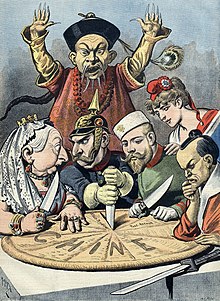Port Arthur
Jump to navigation
Jump to search


English
[edit]Etymology
[edit]Named after British naval officer William Arthur (Royal Navy) (1830-1866) in 1860.
Proper noun
[edit]- Former name of Lüshun (“a port in China”).
- 1901, Great Britain Foreign Office Correspondence on China, 1872-1904[1], volume 4, →OCLC, page 73:
- Subsequently, however, the Russians did proceed beyond Shanhaikwan and captured the towns of Chichou and Hsin Min. I also heard, after my arrival at Lü Shun (Port Arthur) that the Russians had dispatched forces in various directions eastwards, and had sent communications to the local officials bidding them not to be alarmed, as all they had to do was to hand over their munitions of war to the Russians, whereupon the latter would exterminate the Hu* rebels on their behalf.
- 1947, Theodore H. White, Annalee Jacoby, Thunder Out of China[2], London: Victor Gollancz Ltd, →OCLC, →OL, page 271:
- The bitter heart of the treaty lay in the clauses requiring China to give up her sovereign control of Port Arthur and Dairen. Dairen was made an international free port, with special rights for Russia, and the Russians received the right to establish a naval base at Port Arthur on Chinese soil.
- 1952 July, the late H. Carew, “By Special Train in the Far East”, in Railway Magazine, page 488:
- Important among these [negotiations] was control of what the Russians had called the Chinese Eastern Railway from Port Arthur and Dalny [Dairen] up to Mukden and Changchun, a distance of some 450 miles. This line had been fought over from end to end, and had been severely damaged.
- 1972, Theodore Shabad, “PORT ARTHUR”, in Encyclopedia Britannica, volume 18, →ISBN, →LCCN, →OCLC, page 259, column 2:
- Port Arthur became part of the joint municipality of Port Arthur-Dairen, known in Chinese as Lüshun-Talien, or simply Lü-ta, with its seat at Dairen. The population of Port Arthur in the 1953 census was 126,000; that of Lü-ta (1958 est.) 1,590,000.
- 1973 May 27, “Mao still embraces Stalin cult”, in Free China Weekly[3], volume XIV, number 20, Taipei, →ISSN, →OCLC, page 2:
- The Peiping-Moscow friendship and alliance pact was signed in February 1950. Other treaties concluded in the "honeymoon period" had to do with the Manchurian railroad, harbors of Port Arthur and Dairen, petroleum from Sinkiang, and exploitation of rare metals.
- A locality in Yorke Peninsula council area, South Australia.
- A town and former convict settlement in Tasman council area, Tasmania, Australia.
- A city mostly in Jefferson County, Texas, United States.
- An unincorporated community in the town of Grant, Rusk County, Wisconsin, United States.
- A community and former city in the city of Thunder Bay, Ontario, Canada.
Translations
[edit]port in China
|
Further reading
[edit]- “Port Arthur”, in Collins English Dictionary.
- “Port Arthur, pn.”, in Lexico, Dictionary.com; Oxford University Press, 2019–2022.
- “Port Arthur”, in OneLook Dictionary Search.
- “Port Arthur”, in Merriam-Webster Online Dictionary, Springfield, Mass.: Merriam-Webster, 1996–present.
- “Port Arthur” in TheFreeDictionary.com, Huntingdon Valley, Pa.: Farlex, Inc., 2003–2024.
Norwegian Nynorsk
[edit]
Etymology
[edit](city): Ultimately from English Port Arthur.
(street): Called after the city.
Pronunciation
[edit]- (Austlandet) IPA(key): /puʈ.aʈːʉr/
- (Trøndelag) IPA(key): /puʂt.aʂːtʉr/ [1]
- (Guttural R dialects) IPA(key): /puʁt.aʁtʉʁ/
Proper noun
[edit]References
[edit]- ^ A. Dalen, J. R. Hagland, S. Hårstad, H. Rydving, O. Stemshaug (2008) Trøndersk språkhistorie: Språkforhold i ein region
Categories:
- English eponyms
- English lemmas
- English proper nouns
- English uncountable nouns
- English multiword terms
- English terms with quotations
- en:Villages in South Australia
- en:Villages in Australia
- en:Places in South Australia
- en:Places in Australia
- en:Towns in Tasmania
- en:Towns in Australia
- en:Places in Tasmania
- en:Cities in Texas, USA
- en:Cities in the United States
- en:Places in Texas, USA
- en:Places in the United States
- en:Unincorporated communities in Wisconsin, USA
- en:Unincorporated communities in the United States
- en:Places in Wisconsin, USA
- en:Villages in Ontario
- en:Villages in Canada
- en:Places in Ontario
- en:Places in Canada
- Norwegian Nynorsk terms borrowed from English
- Norwegian Nynorsk terms derived from English
- Norwegian Nynorsk terms with IPA pronunciation
- Norwegian Nynorsk lemmas
- Norwegian Nynorsk proper nouns
- Norwegian Nynorsk multiword terms
- Norwegian Nynorsk masculine nouns
- nn:Cities in China
- nn:Places in China
- nn:Places in Norway
